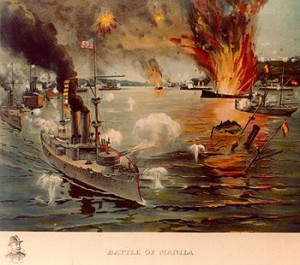
Some battles are close calls. Some are barely victories. Some don’t even have a definite winner. Then there are some battles which have certain winners and the battle itself is completely one-sided. These great victories are rare but not non-existent. One particular battle in American history that was completely one-sided was the Battle of Manila Bay, fought in 1898 during the Spanish-American War. This battle was fought between the Spanish and American fleets off the coast of the Philippines.
The Spanish-American War was, indeed, a one-sided conflict, in and of itself. It was called the “splendid little war” in the United States. Spain was vanquished quickly and the territorial gains that the Americans made as a result were great. The war was initially caused by sensational stories of Spanish brutality in Cuba, which angered Americans. When the US battleship, Maine, blew up in the harbor of Havanna, Cuba, the American people were quick to place the blame on the Spanish. No one is one-hundred percent sure of the reason behind the explosion but, more and more, it seems that the original theory (i.e. Spanish sabotage) is erroneous. Whether the initial accusation was true or not, the truth stands: the Spanish-American War had begun.
Almost immediately, the American Asiatic Squadron under George Dewey set sail for the Philippines. As Assistant Secretary of the Navy, Theodore Roosevelt had ordered Dewey to prepare for war against Spain. This was against the wishes of Roosevelt’s superior, but it mattered not to Roosevelt. While his boss was off work, Roosevelt ordered Dewey to go on high alert and sail to Manila.
When Dewey reached Manila Bay, he was met by the Spanish Far East fleet. Never one to back down from a fight, Dewey told his officer, Charles Gridley, that he “may fire when ready”. The battle commenced and soon it was over. The result was shocking. Dewey’s fleet had destroyed the entire Spanish navy in Manila Bay and had not lost one man in combat. One American sailor died of heat stroke. The extent of the victory was so great that the American conquest of the Philippines from the Spanish was practically accomplished. The conquest of the Philippines from the Filipinos themselves would prove to be much harder.
Dewey’s triumph can be truly described as an “epic” American battle. It was one of the greatest victories in American history and it was decisive in world history as well. The conquest of the Philippines would prove to be important in the political history of Asia and the Pacific. Dewey’s victory at Manila Bay truly changed the region as the next century advanced.
